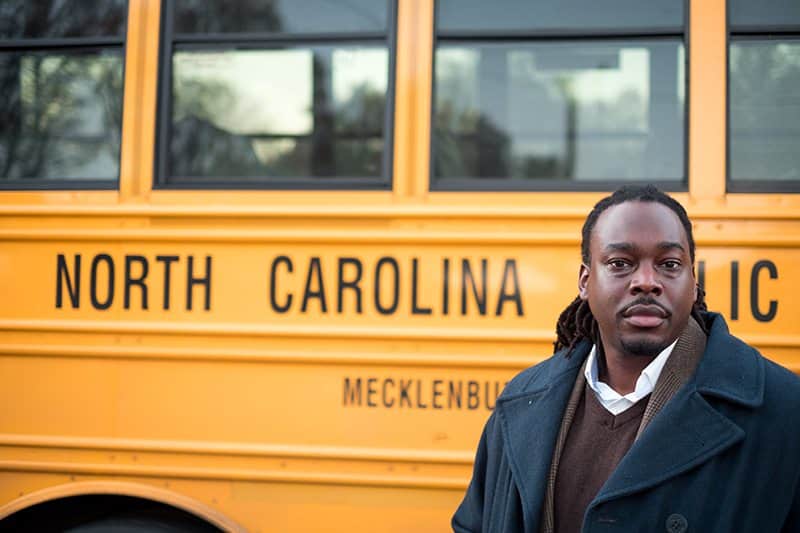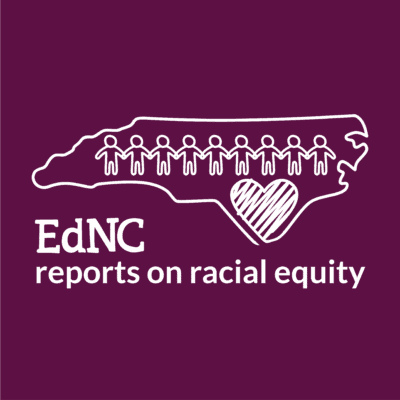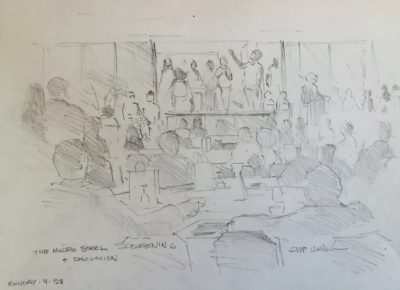

James Ford became popular among his students, in part, because of his authentic and honest ways. He wanted to be the same person in the classroom, he said, that he was outside of it.
The former Charlotte-Mecklenburg history teacher became the state’s teacher of the year in 2014. He recalled earlier this month that if the state’s leaders knew what he was actually teaching, they never would have given him the award.
“I always entered the space of an educator with the orientation of an activist,” the State Board of Education member said during last month’s EduColor Summit. “It was never borne out of good intentions or to say, ‘Oh, I just want to give back,’ or ‘I just really love kids.’ I had a mission in mind. The way that I wielded my curriculum was to interrogate current events and issues of the past through a lens that, one, develops my students’ critical thinking and, two, to really talk about and focus on systems of power.”
On Monday, Ford tweeted his despondency over the Democratic Party’s platform. True to his teaching style, on Wednesday, he connected the current event of the Democratic National Convention with quoted references to Martin Luther King Jr.’s historic Letter from Birmingham Jail — all to connect dots between attracting swing voters with party positions that protect systems of white supremacy.
In work on diversity, equity, and inclusion, Ford uses the definition of white supremacy offered by David Gillborn, a researcher known for his work in critical race theory as it relates to education: “a political, economic and cultural system in which whites overwhelmingly control power and material resources, conscious and unconscious ideas of white superiority.”
On Thursday, one day after Ford’s tweets about the connection to Martin Luther King Jr., the state’s outgoing superintendent of public instruction Mark Johnson accused him in a letter of equating “a large group of sensible constituents to racists.” He questioned Ford’s ability to lead and asked him to consider resigning.
It was a jarring turnabout from the summer’s activity — ranging from racial justice protests to educators of color celebrating this moment for courageous conversations about systemic racism and dismantling systems of inequity in education.
Now, not even a week into the school year, the letter from the state’s highest-elected education leader has the effect of applying pressure to silence Ford in his role on the State Board.
Ford isn’t going to apologize for being the same person he is in the education boardroom as he is outside of it.
“I’m James — an educator, advocate, and believer,” Ford tweeted after Johnson released his statement. “My life’s work is unapologetically exposing and dismantling racism/white supremacy in all it’s [sic] manifestations, as compelled by my faith.”
The concern isn’t that Ford will stop talking. But will Johnson’s actions have a chilling effect on other teachers who see what’s happening to Ford?
“It’s scary,” said Dane West, a white high school history teacher in Wake County. “I know this summer that there were teachers who … were coming in to this school year finally ready to take this leap and have these discussions now. And so I just hope that this doesn’t scare these teachers away from having these conversations. Conversations that our kids want to have.”
Now is the time to have them, presenters at The Friday Institute’s recent Conference on Educational Equity said. Presenters that day asked anyone who cares about education to enter uncomfortable conversation with an open heart.
“Because we can no longer ignore the social impact of the events and the incidents that are taking place in our society, the impact that it has on our students as well as the teachers,” said Tru Pettigrew, a consultant and facilitator of conversations about race. “We carry that with us into the classroom. So not having these conversations, not addressing these issues, not having a willingness to talk about it, is hurting us.”
Turquoise Parker, a Black Durham public school teacher, said reactions like Johnson’s stop the conversation over equity altogether.
“That’s why some teachers don’t say anything,” Parker said, adding that she wasn’t surprised about Johnson’s actions. “Because they’re sitting in fear of retaliation, in whatever ways retaliation could look. And in that fear of retaliation, we become silent. And silence is acceptance. Silence is consent. We have no way to come back if all of us go radio silent.”
Ford has thus far been someone who has not been afraid to be vocal. More importantly, he consistently leads beyond conversation — calling for action.
During its June meeting, the State Board of Education spent the first 30 minutes condemning racial inequities and voicing commitment to fighting systemic racism in North Carolina’s public schools system. The next day, it met to hear about reforming social studies curriculum in the state.
“All the words that were said yesterday about us working to absolve racism and white supremacy, this to me is a document that is a tangible way for us to do that,” Ford said. The Board has delayed voting on new standards until spring of next year.
In November, the Board lamented the feeling that they discuss equity issues over and over without taking action. They recommitted their strategic plan to a foundation of equity.
Months later, after hearing a report to the General Assembly saying school suspensions and crime were down statewide, Ford reminded his fellow Board members that this was a moment to move beyond talk. He implored his colleagues to further examine the data and demand better. The insufficient data painted an incomplete picture, a false narrative, that cast Black and Brown students unfairly in a poor light.
“We said that equity is a part of our strategic plan. At some point, we got to be about that life.”
Ford recalls the opportunities he received after first being named teacher of the year. He was invited to visit and speak all over the state — urban, suburban, and rural areas, alike.
“I wanted to introduce them to the same issues that I felt like my kids were dealing with in our communities,” Ford said last month. “I wanted to go into spaces that my children couldn’t go, and talk about systemic inequality.
“I was talking about equity before it was sexy. I was talking about racism before everybody became an anti-racist all of a sudden. And what I found was that in those spaces, it’s important to talk about this because folks — whether good or bad intentioned — never really considered those things.”
That’s why he tweets what he does, and why he speaks on these issues. And, by the way, it’s why education stakeholders listen to him and other education leaders of color — to hear their unique experiences and broaden our collective perspective.
“Somebody’s got to be there banging that drum,” Ford told EduColor Summit attendees. “And people know, I’ve been banging this same drum all this time, talking about the same issues. But I feel like that’s my calling.”
Editor’s note: Through a grant from the Kenan Charitable Trust, James Ford was on contract with the N.C. Center for Public Policy Research from 2017-2020 leading a statewide study of equity in our schools. The Center is affiliated with EducationNC. Ford currently is the executive director of the Center for Racial Equity in Education (CREED).
Behind the Story
From the editor-in-chief and the reporter:
Sometimes we add these blocks on articles when the story continues to unfold. In the interest of transparency, we want you to understand what is happening and why regarding changes to the article.
We received two emails about the article from Superintendent Mark Johnson and another from Graham Wilson, DPI’s director of communication. The emails sparked conversation, consideration, and reconsideration on our team. We held those emails in balance with the overwhelming positive response we received to the article.
We all knew reporting on the issue of diversity, equity, and inclusion would be hard, complicated, and uncomfortable.
A link to Ford’s original tweet from Monday, August 17, 2020, was not included in the text when the article was published. Here is the tweet.
Superintendent Johnson raised concerns about the timeline in the article.
The article originally said, “On Wednesday, Ford tweeted his despondency over the Democratic Party’s platform.” We’ve changed that to on Monday.
In the next sentence of the article, we added on Wednesday.
“True to his teaching style, on Wednesday, he connected the current event of the Democratic National Convention with quoted references to Martin Luther King Jr.’s historic Letter from Birmingham Jail — all to connect dots between attracting swing voters with party positions that protect systems of white supremacy.”
We clarified the timeline in the following sentence too, adding the language in italics.
On Thursday, one day after Ford’s tweets about the connection to Martin Luther King Jr., the state’s outgoing superintendent of public instruction Mark Johnson accused him in a letter of equating “a large group of sensible constituents to racists.”
In response to the emails, we made some other changes to the article. While the effect of the letter is to try and silence Ford, we realize from the emails that may not have been Johnson’s intention.
We changed the wording of the following paragraph:
Original: Now, not even a week into the school year, the state’s highest-elected education leader wants to silence Ford because he’s uncomfortable with the conversation.
As edited: Now, not even a week into the school year, the letter from the state’s highest elected leader has the effect of applying pressure to silence Ford in his role on the State Board.
We deleted the following paragraph:
Maybe Johnson didn’t realize Ford’s reference to King. Or maybe it would have been more palatable to quote King in February during Black History Month.
Rupen says, “The term “white moderate” did not register in the American lexicon prior to King’s letter. If you didn’t know that, and if reading the terms “white moderate” and “white supremacy” in conjunction didn’t immediately evoke the sentiment in King’s letter, then it is an indictment of an education system that too often only teaches King’s message in February. To be clear: That is not a personal attack on anyone who did not understand Ford’s original Tweet; it’s a statement about the quality of their education system. That was the spirit intended behind these sentences. Nevertheless, to me the article is about a need for open-hearted conversation, so these sentences are counterproductive regardless of intent. These sentences should be removed.”
This article was tagged as news, but we are changing it to a perspective.
This is an article about a recent news event (an open letter responding to a tweet) that occurred in the context of other recent news events (several conferences calling for conversation around racial equity) and includes anecdotes from interviews over time covering Ford, who has established himself as a critical part of the conversation.
Mebane says, “I believe this article should be tagged as news. I feel even more strongly about it because too often when reporters of color write articles about white leaders they are denied voice and the ability to shape what counts as news. However, Rupen prefers for it to be tagged a perspective. As the media industry continues to wrestle with its own role in perpetuating structural racism, we also believe it is important for editors to hear and at times defer to reporters. We have done so in this case.”
Wilson in his email says this article by Keung Hui provides, in his opinion, “fair reporting on the issue.” We lift that article up to you, and welcome your thoughts and feedback.
This issue is important, and we hope the conversation continues.
In Johnson’s email he writes, “The letter to James Ford actually encourages a response… which is not silence and is actually more conversation” (ellipsis in the original).
In Wilson’s email he writes, “He is calling on another state leader to not use inflammatory language so we can have productive conversations about these issues without excluding educators and parents who may hold moderate political beliefs.”
Later in the school year, we will be inviting the superintendent, the candidates for superintendent, and Wilson to a listening session with teachers of all political views to discuss the policing of language and its chilling effect on all issues, including diversity, equity, and inclusion.




